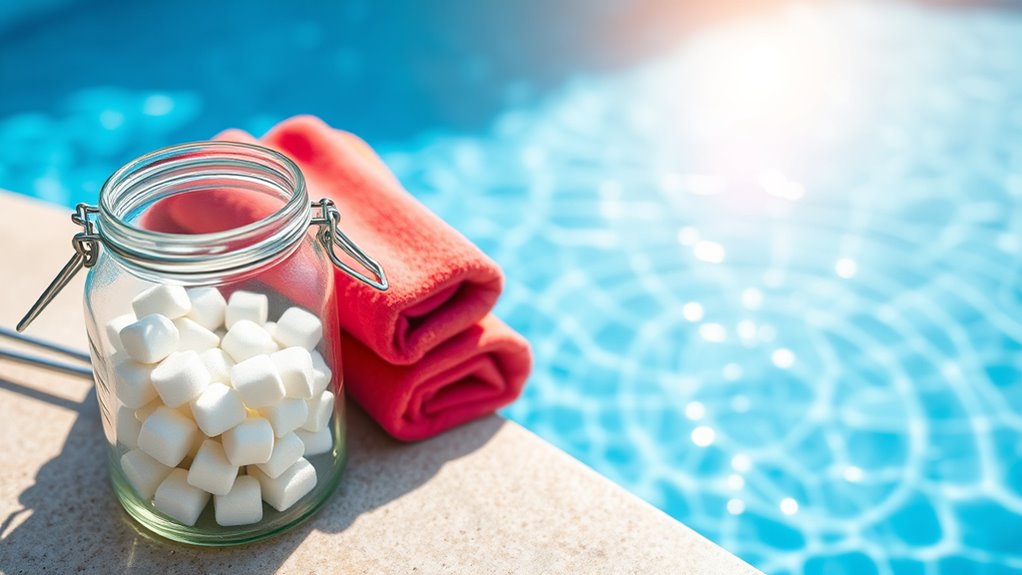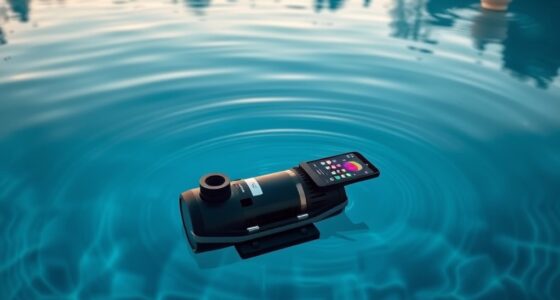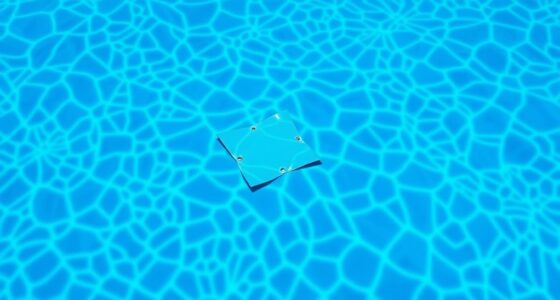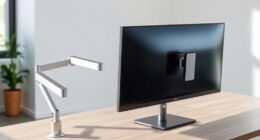Chlorine tablets play a vital role in pool care by keeping your water clean and safe. They provide around 90% available chlorine for effective sanitation, reducing bacteria and algae growth. Using a floating dispenser allows for even distribution, making maintenance simple. Plus, their stabilized formula means less need for additional chemicals. With proper use, you’ll maintain consistent chlorine levels, ensuring a healthy swimming environment. Want to discover more about maximizing your pool care routine?
Key Takeaways
- Chlorine tablets effectively sanitize pool water, maintaining safety and cleanliness for swimmers by killing harmful bacteria and algae.
- They provide a consistent release of chlorine, ensuring stable Free Available Chlorine levels throughout the pool.
- The stabilized formula minimizes the need for additional chemicals, simplifying pool maintenance routines.
- Using a floating dispenser allows for even distribution, preventing concentrated areas of chlorine that could harm surfaces.
- Proper handling and storage of chlorine tablets are essential for safety, preventing skin irritation and accidental ingestion.
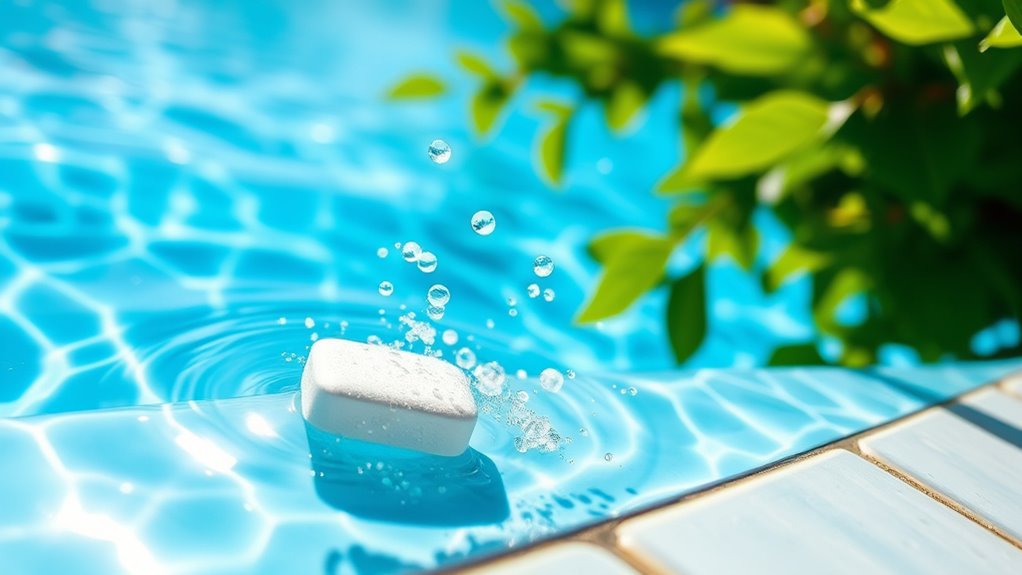
Chlorine tablets are an important part of pool care, guaranteeing your water stays clean and safe for swimming. These tablets contain a high percentage of available chlorine, usually around 90%, which makes them a reliable choice for sanitation and disinfection. You’ll find that using chlorine tablets is easy; they typically come in a form that you can place in a floating dispenser. This method helps release chlorine evenly throughout the pool, creating a stable environment for your swimming experience.
One of the key benefits of chlorine tablets is their ability to maintain consistent levels of Free Available Chlorine in your pool. This consistency is significant for controlling algae and bacteria, keeping your pool water clear and inviting. Plus, the stabilized formula of these tablets reduces the need for additional Cyanuric Acid after your initial balancing, saving you time and effort in the long run. You’ll appreciate the easy storage and handling that chlorine tablets offer, as they can be purchased in bulk and shipped conveniently.
When it comes to types of chlorine sanitizers, tablets are among the most popular options. While liquid chlorine and granules are also available, each has its own strengths and weaknesses. For instance, granules dissolve faster and provide quick sanitization, while liquid chlorine can be more cost-effective for larger pools but requires precise dosing. In contrast, chlorine tablets deliver a balanced and stable release of chlorine over time, making them particularly convenient for weekly use. You’ll typically need to refill the dispenser about once a week, which fits seamlessly into your pool maintenance routine.
To use chlorine tablets effectively, always place them in a floating dispenser to avoid direct contact with pool surfaces. Make sure to follow the manufacturer’s guidelines for dosage based on your pool size and usage frequency. Avoid using crushed or broken tablets, as this can lead to uneven chlorination. It’s essential to confirm that the tablets don’t sink to the bottom of the pool, as this can create areas of concentrated chlorine, which could be harmful.
While handling chlorine tablets, keep in mind the health and safety considerations involved. Proper handling can prevent skin and eye irritation, so store them safely to avoid accidental ingestion. Following recommended dosage guidelines is significant for maintaining safe chlorine levels, guaranteeing your pool remains a healthy place for swimming.
With these tablets in your pool care arsenal, you’re set for a safe, enjoyable swimming season.
Frequently Asked Questions
Can I Use Chlorine Tablets in Saltwater Pools?
You can’t use chlorine tablets in saltwater pools.
Saltwater systems rely on a salt chlorine generator to produce chlorine from the salt you’ve added, which keeps the water balanced and sanitized.
Using chlorine tablets can disrupt this balance and interfere with the generator’s function.
Instead, stick to the salt system for ideal water quality and a smoother swimming experience.
Your pool will thank you for it!
How Often Should I Test Chlorine Levels?
You should test chlorine levels at least twice a week for a regularly used pool, especially during summer.
If the pool has heavy usage, like parties or kids swimming, increase the frequency.
After storms or extreme weather, check the levels too.
In cooler months, you can test less often, but always monitor after adding any chemicals.
Staying consistent with testing guarantees your pool remains safe and enjoyable for everyone.
What Happens if I Overdose on Chlorine Tablets?
If you overdose on chlorine tablets, you might experience symptoms like coughing, chest pain, and difficulty breathing.
Ingesting them can lead to nausea, vomiting, and severe abdominal pain.
High levels of chlorine exposure can irritate your skin and eyes, causing rashes or burning sensations.
Chronic exposure might worsen respiratory issues, especially if you have pre-existing conditions.
In severe cases, you may need emergency medical treatment to manage chlorine poisoning effectively.
Are There Alternatives to Chlorine Tablets for Pool Sanitation?
Oh sure, who needs chlorine tablets when you can plunge into the world of pool sanitation alternatives?
You’ve got options like bromine, which offers stability, or mineral sanitizers that cut chlorine use by half.
Saltwater systems convert salt to chlorine—fancy, right?
Don’t forget ozone or UV systems that promise to keep your pool pristine without the traditional methods.
Just pick your poison—er, I mean, your alternative, and keep swimming happily!
How Should I Store Chlorine Tablets Safely?
To store chlorine tablets safely, keep them in a cool, dry place, ideally between 50-70°F.
Confirm the area’s well-ventilated and free from direct sunlight.
Use the original, tightly sealed container, and make certain it’s watertight.
Store them out of reach of children and pets, preferably in a lockable location.
Regularly inspect the containers for damage and check the tablets for any signs of degradation to maintain their effectiveness.
Conclusion
Incorporating chlorine tablets into your pool care routine is a game-changer. They not only keep your water crystal clear but also protect against harmful bacteria and algae. Imagine diving into a rejuvenating oasis, knowing it’s safe and sanitized. By understanding the importance of these tablets, you’re not just a pool owner; you’re a steward of your aquatic paradise. So, don’t overlook this essential step—your pool deserves the best, and so do you!
